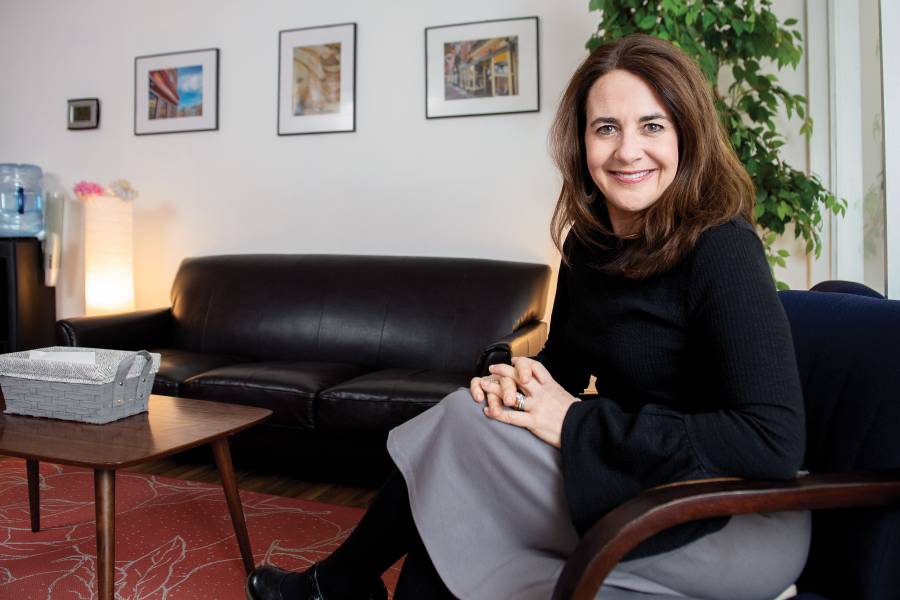There aren't many places Cynthia feels comfortable. She spent her childhood fearing her father would kill her mother in one of his fits of rage. As a teenager, she turned to alcohol and drugs to numb her feelings. Now 57, Cynthia has been dependent on opioids for more than two decades, and she feels stigma weighing on her as she walks through her Southwest Baltimore neighborhood.
But over the past year, Cynthia—whose name has been changed to protect her privacy—has found solace in a former church a few blocks from her home. At the SPARC Women's Center, she has joined art classes and writing workshops, group therapy, and dance lessons. And she's begun to open up about a lifetime of trauma, mental health problems, and addiction.
"It's just women having fun and supporting each other and not judging," says Cynthia, a slim woman with strawberry blonde curls. "I can come here and talk these ladies' ears off and they say, 'Cindy, it's OK.'"
SPARC, short for Sex workers Promoting Action, Risk reduction, and Community mobilization, is the culmination of decades of research by its founder, Susan Sherman, SPH '00 (PhD), a professor in the Johns Hopkins Bloomberg School of Public Health. The center provides health care, opioid maintenance therapy, counseling, and other support for some of the most vulnerable people in society: women, both cis and trans, and nonbinary people, including those who use drugs, are homeless or on the brink of homelessness, or sell or trade sex. Its doors first opened in November 2017, with funding from the National Institute on Drug Abuse. Other funding sources include the Ryan White HIV/AIDS Program, the Abell Foundation, and the Maryland Opioid Crisis Fund.
"We see and bear witness to a lot of people that many in our society do not want to see or bear witness to," says Sherman, who previously co-led the Bloomberg American Health Initiative's addiction and overdose focus area. "For most of the people we serve, trauma is their gateway drug."
Sherman bounces through SPARC on a recent Tuesday, greeting employees with hugs. She frequently gets pulled aside to discuss the latest crisis—and there are often crises here. Just a few days before, a woman had been brought to the center in the midst of an overdose. A few weeks earlier, a homeless client died owing to a chronic health condition.
Sherman describes herself as an "activist researcher focused on social justice," and she studies the structural determinants that push women into drug use and sex work—and the environmental factors that can help them avoid contracting HIV and other illnesses. Among her varied research projects, she spent years studying dancers on The Block, Baltimore's red light district, many of whom sell sex to pay for drugs. Sherman worked with the Baltimore City Health Department to establish a needle exchange program on The Block, and, in many ways, SPARC grew out of her conversations with the women there.
At SPARC, which is directed by Emily Clouse, the guiding ethos is harm reduction—providing judgment-free care and services that are not contingent on sobriety. "We meet our people where they are right now," says Katelyn Riegger, SPH '17 (MS), the center's clinical director.
From the moment people walk into SPARC, the goal is to make them feel safe and comfortable. The center is bright and cheerful, with colorful rugs and pillows and Instagram-worthy art on the wall. It's part all-girl's high school, part cozy therapist's office. "Having a pretty space was very important to us," Sherman says. "That's not something our people necessarily have in other areas of their lives. It's part of treating them with respect."
Also see
Many clients linger in the common room, watching TV, drinking coffee, or napping on the upholstered chairs and couches. "Sleep is a service," Sherman says, explaining that many of the homeless clients do not feel safe sleeping outside or in a shelter for fear they will be attacked or robbed. "Providing a safe space for people to sleep is huge." SPARC is not a shelter; the center is open four days a week for five to seven hours each day.
It can take some clients days or weeks to venture beyond the common room, Riegger says, but those who do can tap into a wide variety of services. Case manager Laniker Hunter helps them find housing and referrals to other programs. Riegger, who has a master's in social work, provides individual therapy. Another staff member helps clients get access to PrEP, a daily pill that dramatically cuts the risk of contracting HIV. Baltimore City Health Department doctors and nurses provide gynecological care, birth control, wound treatment (intravenous drug users are prone to abscesses), and treatment for sexually transmitted infections three days a week.
Yet SPARC is more than a health clinic. There are weekly yoga classes. A literacy program. Occasional haircuts and beauty treatments. Legal services. A food pantry with organic produce. Clients can shower, wash their clothes, pick out an outfit from a closet of giveaways. Outreach worker Alex Wilson leads dance lessons—the staff calls them "twerkshops"—as well as sessions in art and creative writing that have become a sort of group therapy. SPARC welcomes people who are not welcome other places, Sherman says. "People who get kicked out of the library, people who talk to themselves or hear voices, they can come here."
The staff is trained in de-escalation, helping those who are agitated calm down. They speak with them quietly, make it clear that they hear and care about their concerns, and help them find a space where they can cool off. Only once has Riegger had to ask someone to leave, and they were invited to return the next day.
View this post on Instagram
SPARC is also focused on helping those who are unable to make it to the center. Three to four evenings a week, a group of workers drives through Southwest Baltimore neighborhoods in a van painted with a purple city skyline. They head to areas frequented by people who sell sex or use drugs, dispensing condoms, safer drug use kits, Narcan, snacks, toiletries, and cards inviting people to visit SPARC. They also respond to texts or calls for supplies that come through the outreach program's hotline. "At this point, 90% of the people we pass know who we are," says outreach coordinator Katie Evans. "Sometimes when we drive down a street, people chant, 'SPARC, SPARC, SPARC.'"
The van and the center each serve about 80–100 people a week, more than double their clientele a year ago. Sherman and Clouse are leading a study looking at SPARC's impact on the rate of HIV infection and STIs in the surrounding community. Ultimately, Sherman and her team hope that SPARC will give clients the tools to improve their lives in whatever way they wish to change. For some, that might mean beginning opioid maintenance therapy or getting supplies to use drugs more safely. For others, that might be building job skills and finding housing.
"Someone recently told me, 'This is the only place I feel safe,'" Evans says. "To me, that's success. Every time we have interaction with someone and they leave feeling seen, that's success."
Posted in Community
Tagged public health, hiv/aids, women's health, opioids, sex work, social work










